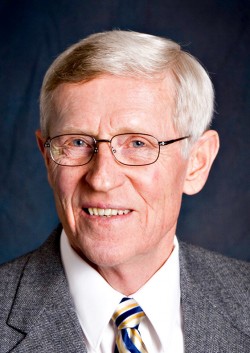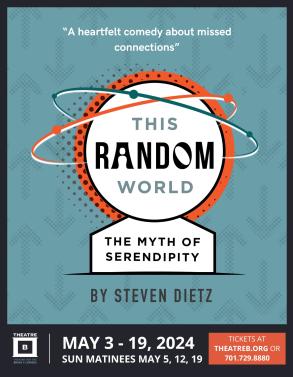News | May 25th, 2016

By Matthew Musacchia
To an outside observer it might have looked like a traditional service at Fargo’s Plymouth Congregational Church last Tuesday, complete with filled pews, a speaker, and even a guitarist. But the attendees, many from the small town of Buffalo, North Dakota, were not there for a religious service.
They were there to hear Dr. John Ikerd, professor emeritus of the University of Missouri, talk about something very different- the effects of corporate agriculture on small towns, especially in terms of Concentrated Animal Feeding Operations (CAFOs).
Giving a speech entitled “Corporate Agriculture vs. Family Farms: A Battle for Hearts and Minds of the People” Ikerd had been invited by the Dakota Resource Council to speak across the state before North Dakotans vote on Measure 1 on June 14th. He concluded his tour at several other stops across the state.
“I don’t spend my time just travelling around,” Ikerd began, after thanking the attendees. “In fact this is one of the least favorite things that I do is come and meet people like you. Not that I don’t like you as people or like people who are positing these issues, but whenever I come in and talk to a group that has to do with the concentrated animal feeding operations, it’s always a community that’s brought in with a situation that they would rather not have had forced upon them.”
Many in the audience took this message personally. Due to a pending plan to build a large hog farm in Buffalo, North Dakota most of the upwards of twenty crowd drove all the way to Fargo to hear him speak. They themselves have formed a group opposing the proposed farm, called the “Concerned Citizens of Buffalo” in reaction to this.
During the speech, Ikerd drew on his long experience in economics and agriculture to present his argument against corporate farming, and what in his experience he saw as possible negative consequences of the successful implementations corporate agriculture in small communities.
Growing up on a small farm in southwest Missouri, Ikerd earned his Bachelor’s Degree in agricultural economics from the University of Missouri, worked for a meat packing plant in Kansas City, and then went back to the same university to earn both his Master’s and PhD degree in the same subject. He spent thirty years working at land grant universities in the Midwest and South.
During much of that time, Ikerd said he advised farmers to put into practice the same techniques he now opposes.
“We kind of bought into this whole idea of what I was taught in graduate school that farming as a way of life was out of date” he said. “That farming had to be a business. If you’re going to survive on the farm you have an economic bottom line; that’s what it had to be. I talked to family farmers and said if they had a family farm you’ve got to separate the family business from the farm business and don’t let the family get in the way of the farm.”
Ikerd said he changed many of his opinions while in Georgia, when during the 1980s farmers who had followed his advice (or advice similar to what he had been giving) were being pushed out of their own farms, and were unable to cope with debt and the struggling economy. It was about that time that Ikerd sincerely pushed for more sustainable options in farming.
“The rural communities were withering and dying” Ikerd said “as a consequence of the demise of the family farm.”
Ikerd did not often directly address the situation in Buffalo, but discussed issues ranging from Genetically Modified Organisms and other issues in corporate agriculture to health and well-being of people affected by CAFOs (concentrated animal feeding operations), as well as environmental impacts and other consequences that he says often come from corporate farms. Much of his speech echoed the theme that the economic bottom line practiced by these agricultural corporations not only failed to take these more human factors into account, but also that it tended to betray basic economic principles.
“A corporation is purely an economic entity” he said later, distinguishing between corporations and family farmers. “You know there are individual families and individual farmers out here that are just as ruthless as any corporation…but an individual at least has the capacity to have some compassion, an individual has the capacity to look at their neighbor and say ‘gee is it really right’ what I’m doing?”
Ikerd said that the laws and regulations were far more effective when applied to family farmers, who he argues have a greater capacity to take into account factors such as impact on the environment, sustainability of land, and overall personal well-being.
“When you bring corporations into the environment of agriculture when people trust the farmer, your neighbor, to be a caring compassionate ethical person” said Ikert. “Not all the farmers are caring and compassionate and ethical person, but the laws that regulate agriculture is are based on that premise.”
“It’s [corporate agriculture] still regulated as if it is still run by people who have those traditional family farm values,” Ikerd continued, saying the regulations are adequate if you have traditional family farm values, but not to deal with “corporate agricultural mentality.”
“Unless you are going to regulate agriculture like you would any other industry, that’s just a recipe for disaster, and I would think we ought to have learned something about the impact of industries in general.”
“I thought [Ikerd’s speech] was excellent” said Judith Von Bank, a resident of Buffalo who herself lives near where the proposed hog farm will be build. “It was excellent. I guess how I felt was we really knew all about this from all the work that we had done but this just enhanced it…. It gave me a shot in the arm to know we’re right. He was excellent. My husband and I both thought that. We mentioned that, talked about that the next day. It’s just too bad that other people couldn’t- not too many people heard him around here. Because we ask questions and things, it’s hard to explain all the things that can go wrong and you know he really did cover everything.”
As for Ikerd, he says that while there is nothing illegal in the sort of permits that will allow things like CAFOs in North Dakota, people have to decide what sort of life they want in their communities.
“I can’t tell you what to do,” he said “This is your state, this is your community, the decisions to be made in Buffalo, the decisions to be made in the ballot box on June 14th, are your decisions to be made. I just want to try to share my truth so that you can come up with your truth and your decisions, so I make that clarification.”
April 18th 2024
April 18th 2024
April 18th 2024
March 21st 2024
February 15th 2024
__293px-wide.jpg)




